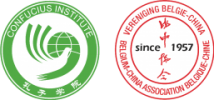
The Belgium-China Association was founded in 1957 to promote friendship between Belgium and China. Anyone who wants to help us to achieve this aim can become a member, without distinction of language, race or creed. The Association is a totally independent organization that essentially relies on the work of volunteers in order to make Chinese culture more accessible to Belgians and to develop exchanges between both countries.
More information:
- – Current way of working
- – History
- – Organization
The initial goals of the Association have been adjusted to the new reality. More than ever, the Association has become an information centre and offers the following services:
- – The Confucius Institute in Brussels: Chinese Institute, which has been organizing for 25 years Chinese language courses, but also courses in Chinese cooking, Tai Chi, Qigong, history and Chinese culture;
- – Our magazine in Dutch « China Vandaag » and its French counterpart « Chine Actuelle »;
- – Our lectures on Saturday afternoon on various subjects;
- – Our monthly Cineclub and the participation of our audio-visual services to film festivals;
- – Our library/documentation centre that contains the most important literature works, covering 50 years of recent history and giving the public access to an electronic database with the latest information on today’s China;
- – Our exhibitions in the Association or outside with partners;
- – Contact with experts for lectures or training programs;
- – The activities we organize for the Chinese New Year, for the National Chinese Day on the 1st of October, or for other important events;
- – Our thematic trips for those who want to discover something else than classical tourism;
- – Our cooperation in different cultural events, travel fairs and more, always with the aim to promote Chinese leaning and exchange with the country.
The Popular Republic of China was founded in 1949. Belgium didn’t recognize it yet at this point, as it still recognizing the ancient regime of Kuomintang, who had retreated in Taiwan. As Belgium had many exchanges with China before 1949, a group of Belgians was convinced that our country could not ignore a government that represents the overwhelming majority of the population of the most populated country in the world. In 1957, they established the Belgium-China Association. The most famous of its founders was the internationally renowned politician Camille Huysmans.
The association was initially working along two axes: on one hand, the promotion of commercial relations; on the other hand, the lobbying for the diplomatic recognition of the Popular Republic. Trips to China were regularly organized, either as commercial missions organized by the Economic Commission or as thematic travels, organized by another Commission. Chinese books and magazines translated in foreign languages were distributed in Belgium. Large cultural activities attracted a great number of people. But the most spectacular activity was the organization of Queen Elisabeth’s travel to China in 1961; this was a significant sign of the changes in the otherwise very isolatory attitude towards the Popular Republic of China.
In the year 1971, a radical change took place. Belgium eventually recognized the Popular Republic of China: the political, economic and cultural relations started to develop. The Association was playing a major role in promoting this development, for instance by organizing annual trips to China.
The evolution sped up with the political opening-up policy launched by Deng Xiaoping in 1978. China was opening to the word, firstly to businessmen. The Association was following suit: it was gathering an increasing number of associates, got the attention of a larger public and organized more activities.
The situation changed again in 1989 with the events in Eastern Europe and at Tiananmen Square: it was not easy to declare oneself “friend of China”. Even if the Association was critical about the violence at Tiananmen Square, it kept its positive opinion about the Popular Republic of China, taking into account the huge improvement of the Chinese people’s way of life since 1949.
In the 90s, the economic relations rapidly resumed, but the cultural relations broken off in 1989 were still not officially restored. What is striking is the change in tone in the media: the positive approach of the 80s was replaced by its opposite in a new global context. Although information about China had never been so available, the approach still had to be open and balanced. The reforms implemented the last 20 years were particularly subject to criticism.
The Association is a non-profit association with some 500 dues paying members. The supreme body is the General Assembly, composed of approximately sixty effective members. The General Assembly elects a Board. Each due-paying member can be eligible as an effective member of the Board.
The Association is self-financing; the operating costs are covered by the membership fees and by the income collected with our diverse activities. The Association receives no financial subsidies, but benefits from a project of the Brussels capital region that enables it to employ four TCT/ACS. These employees provide a logistic support of the activities organized and led by enthusiast volunteer associates.
The Board
The Board sets the basic guidelines for the association, monitors the financial situation and appoints the members of Executive committee.
President :
VAN DUYSEN Hans
Vice-president :
DE GROEVE Wim
Managing Director :
DE GROEVE Wim
VAN DUYSEN Hans
Secretary :
DE GROEVE Wim
Members :
VAN DUYSEN Hans
LECHIEN Philippe
DE RIDDER Koen
MEERSMAN Mia
HUANG Wenfang
DE GROEVE Wim
DE SCHUTTER Mark
LAMBRECHTS Gert
Commissioner :
The commissioner is appointed by the commission members.. He monitors the yearly balance and the accounting of the Association. He/she is appointed for 3 years. The commissioner of Belgium-China Association is the Count Thierry de Liedekerke.
